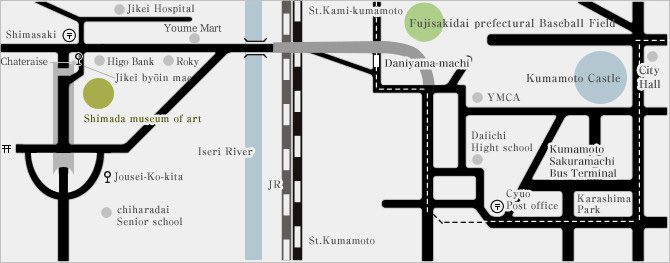
■closed


※closed for exhibition changes
2026.03.24 tue~ 04.01 wed
The Shimada Museum of Art
Open: 10:00 – 17:00 (last entry 16:30)
Closed: every Tuesday, the 2nd & 4th Wednesday of every
month
Year-end and New Year holidays
(open Tuesdays and Wednesday when public holidays)
*also closed during exhibit changes or unforeseen
circumstances
Admission: adults \700
university/high school students \400
middle/elementary school students \200
Transportation:
3 minute walk from Jikeibyouinmae bus stop of the Araobashi bus
line.
2 minute walk from Jyouseiko bus stop of the Jyouseiko bus
line.
10 minutes by car from JR Kumamoto Station.
50 minutes by car from Kumamoto Airport.
This museum was opened in the autumn of 1977 in realization of
the wishes of Mr. Shimada Matomi, a student and lover of
Japanese antiquities. He dedicated his life to the preservation
and study of historical documents and artistic handicrafts
related to the Samurai culture in Kumamoto. In his later years,
he wanted to preserve and share his collections with the public
in the hope of providing opportunities to appreciate the history
and traditions of Kumamoto. He laid the foundation for the
museum on the grounds of his private home.
We hope your visit to the Shimada Museum will be an opportunity
to learn about and appreciate the treasures of Japanese history
together with Samurai culture.
The central themes of the Shimada Art Museum collections are
Kumamoto arts and crafts from the Momoyama-Edo period.
Exhibitions are held regularly with collection themes chosen
three to four times a year. Representative collections of the
museum are the works and relics of Miyamoto Musashi. (Exhibits
are subject to change)
For more information, please see the
Japanese page.
MIYAMOTO MUSASHI
Miyamoto Musashi was born in Harima, now Hyogo Prefecture, in
1584. He won his first duel at age of 13 over master swordsman
Arima Kihei of the Shinto Style. In his sixty-odd duels to the
age of 29, he remained undefeated. He founded the Niten Ichi
Ryu style while continuing to pursue the spirit of
swordsmanship and the secrets of the arts of war. In 1640,
when Musashi was 57, Lord HOSOKAWA Tadatoshi invited him to
Kumamoto as a guest of honor. Musashi resided here for five
years until his death in the early summer of 1645. During his
stay, he authored “Thirty-five Articles on the Art of War”,
“The Book of Five Rings”, and other works. He spent much of
this period practicing tea ceremony, Zen, and calligraphy. He
was also a painter of renown. His works, which radiate the
power of his spirit in vivacious brush strokes, stand unique
in the history of Japanese ink-wash monochromes.






